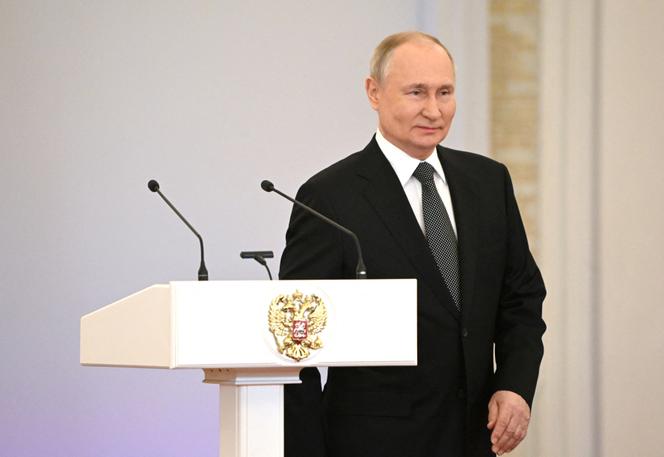


Limited suspense, maximum staging. During a conversation on Friday, December 8, described as "spontaneous" by the Kremlin, Vladimir Putin announced his candidacy for the presidential election on March 17, 2024. At the end of a military award ceremony in the Kremlin, the president was addressed by one of the newly decorated "heroes." "In the name of all the people, in the name of Donbas, I would like to ask you to take part in these elections, because there is still a lot of work to be done," said Artem Zhoga, commander of the "Sparta" battalion of the "Donetsk People's Republic," which was annexed by Russia in September 2022.
Putin's reply, delivered in a barely audible voice, but confidently, "I won't hide it from you, I've had different ideas at different times. But you're right, the time has come to make this decision. I will be a candidate for president of the Russian Federation."
This minimalist, almost discreet announcement is already being presented in the Russian media as confirmation of the Russian president's modesty, as he is fully occupied with his task. It is also likely to set the tone for the perfectly dull election campaign ahead, in which Putin's re-election can be regarded as a formality.
On November 20, the daily Kommersant reported on the training seminar organized in Moscow for vice-governors and heads of electoral commissions in the Russian regions. The Kremlin's strategists issued the following instructions: "a calm campaign, with no superfluous shows," with a result equal to or better than that of 2018, when the president won with 76.69% of the vote.
The main part of this was achieved in 2020 when the Kremlin led a blitzkrieg to amend the Constitution in such a way as to allow Putin to "reset to zero" the number of his terms. The president justified this maneuver on the grounds of "the need for stability in an unpredictable and uncontrollable world," although he did not reveal his plans for 2024. Yet the world described by the Russian president has not exactly calmed down since.
The fact that the ad features a soldier from the "new regions" (the Russian term for the Ukrainian territories annexed by Russia) is another indication of the campaign's message. 71-year-old Putin, in power since 1999, will appear as the nation's protector. In other words, Putin is devoting himself to staying in the Kremlin in the name of a war he started. "A slave on this galley," is how he described himself in 2008.
This doesn't necessarily mean that military operations in Ukraine will take center stage. While the Russian army can pride itself on holding the front, it has no convincing successes to show for it. On November 28, in a solemn address to the Russian Orthodox World Council, Putin for the first time described the conflict as a "war of national liberation" – "a battle for sovereignty and justice (...), the security and well-being of our people, the highest historical right to be Russia."
You have 45% of this article left to read. The rest is for subscribers only.
